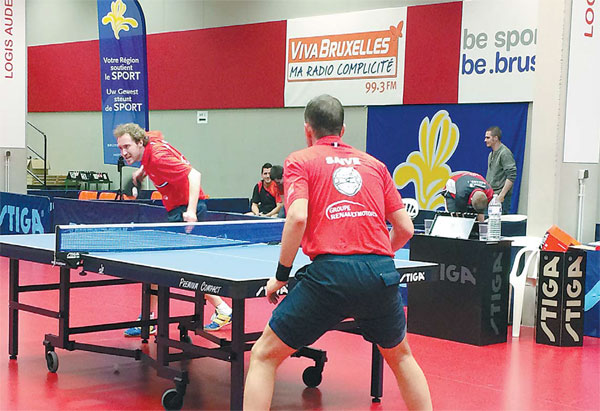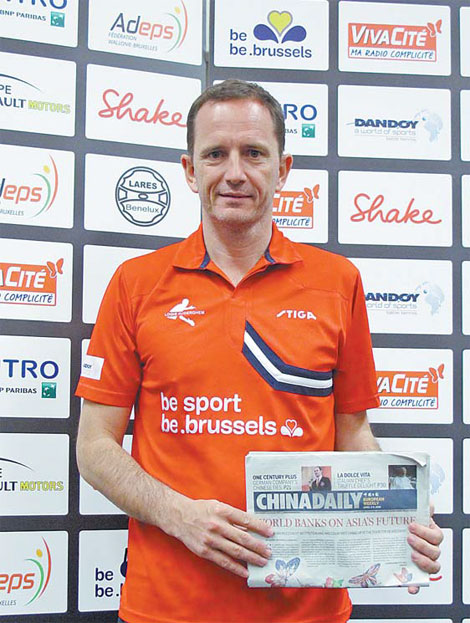No longer No 1, but still a champion
Updated: 2015-05-01 08:13
By Mao Xi(China Daily Europe)
|
|||||||||||
Belgium's ping-pong veteran Big Saive stays on court to help promote the sport in Europe
"It's fun," Belgian ping-pong veteran Jean-Michel Saive says, when asked why he keeps playing. "It's a diversion from my regular office work.
"It motivates the youngsters to progress if they can beat me, a former world champion, and it also brings me friendship from all over the world. Plus, I still make a good living out of it."
|
Belgian ping-pong player Jean-Michel Saive plays in his local table tennis club, Logis Ouderghem. Photos by Gao Shuang / For China Daily |
Saive was born into a ping-pong family. His mother won the Belgian ladies' title while she was pregnant with him, and his father was also a top player in his homeland. He started playing early and was selected for the Belgian national team aged just 13.
Nicknamed by fans Big Saive to distinguish him from his brother, another skilled player, he is best known in China for his long relationship with Chinese coach Wang Dayong.
When Wang first arrived in Belgium, at the end of the 1990s, no Chinese coach had ever trained a European player, and he was not sure he would fit in. However, Saive soon adapted to his philosophy and training methods.
The Belgian says the significant thing about training with Wang was that it gave him an opportunity to understand how Chinese players view Europeans, increasing his chances of winning top matches.
He accepts the Chinese concept of "using forehand attacks as a major weapon, hitting the ball early and taking the initiative in offense", he says, and he was able to nurture an aggressive style.
Wang not only trains Saive in ping-pong, he says, but also in how to be a person. Unlike most coaches and athletes, the duo has stayed together through the bright and dark periods.
Due to his reputation in the sport, Saive has been elected as chairman of the European Olympic Athletes' Commission and is a member of the International Table Tennis Federation Athletes Committee, to name just two of his titles. He says he now sees the ping-pong in a larger picture.
Saive was world No 1 for 515 days, starting February 1994, and the success of his generation of European players led to a surge in young people playing the sport. However, their spotless performances at continental competitions for the past two decades have blocked many newcomers from making a mark.
The same effect has been seen in China, which has ruled the tables at elite tournaments for some time. Although various committees have attempted to change the regulations to make finals more open for international players, Chinese players remain dominant.
This might make the development and internationalization of ping-pong problematic, Saive says. "Often young European people just see table tennis as a Chinese sport," he laments.
It would be naive, however, to suggest Chinese coaches and players will slow down, or that China will abandon its systematic selection and training of players.
"Instead, as table tennis is China's national sport, their knowledge is so high, their experience is so rich, it would be wonderful if the Chinese team could share that knowledge with international players," the Belgian says. "That will be more fun for the Chinese players, too, if they can play against others with different styles."
There are other things that have hindered the development of ping-pong in Europe. Saive says that, unlike in China where the sport enjoys political significance, helping to draw a large pool of talent, European players are normally self-sponsored and can easily switch to other sports, so it is very difficult to keep gifted players focused.
Wang says that few senior European players, particularly of Saive's generation, are coaching or passing on their knowledge to the young players.
Ping-pong has enjoyed some progress over the years. The marketing is more professional, while it now has the second-largest sports federation, involving more than 210 countries, second only to volleyball. In Belgium, Saive says they have built a team of five international coaches in the past few years, a large number for a relatively small country.
This summer, Europe will host its first European games, and Saive says events such as this are important to raise the profile of sports such as table tennis.
Wang, who has retired, still coaches Saive once in a while, and they also scout for potential stars at youth tournaments in Belgium.
The former world No 1 also travels to China once or twice a year, either for tournaments or on business trips, and he sometimes features in exhibition matches against Chinese players to promote the sport.
He says it has been an amazing experience for him to witness China's transformation since the 1980s. Wang says it is rare for a European player to receive such adulation from Chinese fans, crediting his appeal to his skill and the fact he is open to other cultures and people.
Asked when he plans to retire from the sport, Saive answers only: "One day. My body and mind will tell me when it's time."
For China Daily
|
Saive with a copy of China Daily European Weekly. |
(China Daily European Weekly 05/01/2015 page28)
Today's Top News
Protest against police violence expands to NYC
Milan tightens security ahead of Expo opening
Chinese scientists discover 'batman dinosaur'
China trainmakers seek control of Bombardier's rail unit
US Senate rejects bid to toughen Iran nuclear review bill
New Zealand voices dismay at executions in Indonesia
China hits out as Abe visits the US
No hiding place overseas for fugitive officials
Hot Topics
Lunar probe , China growth forecasts, Emission rules get tougher, China seen through 'colored lens', International board,
Editor's Picks

|

|

|

|

|

|








